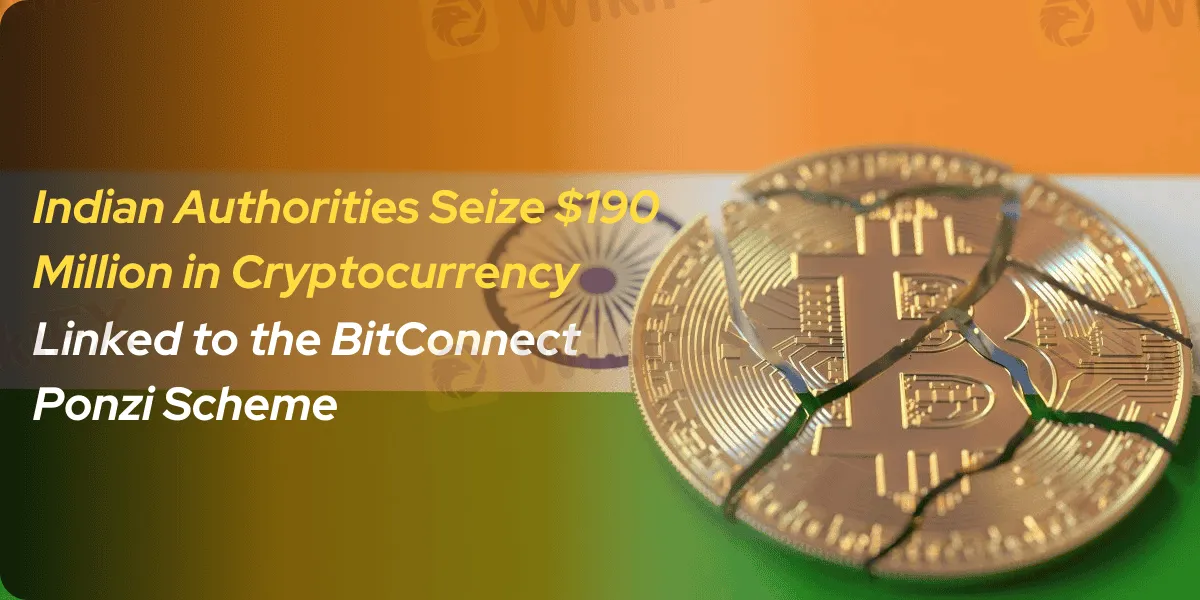简体中文
繁體中文
English
Pусский
日本語
ภาษาไทย
Tiếng Việt
Bahasa Indonesia
Español
हिन्दी
Filippiiniläinen
Français
Deutsch
Português
Türkçe
한국어
العربية
Indian Authorities Seize $190 Million in Cryptocurrency Linked to the BitConnect Ponzi Scheme
Abstract:In a continuing investigation into cryptocurrency Ponzi schemes, Indian authorities have seized nearly $190 million worth of cryptocurrency associated with Bitconnect. This notorious scam, which was uncovered in 2018, caused significant financial losses for investors across 95 countries, totaling around $2.4 billion. Bitconnect, which launched in 2016, collapsed in 2018, and its founder, Satish Kumbhani, was indicted by the U.S. Department of Justice in February 2022. Kumbhani is alleged to have created a global network of promoters who were paid commissions to promote the Ponzi scheme.

The Seizure and Investigation
According to a report, the Indian Enforcement Directorate (ED) has actively pursued leads related to the Bitconnect fraud. The authorities recently seized $190 million worth of cryptocurrency as part of their investigation into the Ponzi schemes operations. These assets, which include digital currencies, cash, and a Lexus vehicle, were found in connection with the fraudulent activities linked to Bitconnect.
The investigation has expanded to include several individuals involved in the fraud. Among them is Shailesh Babulal Bhatt, a Gujarat-based man who was arrested in August last year for his role in the crime. Bhatt had invested in Bitconnect and, after the platform collapsed, resorted to extreme measures to recover his funds. He kidnapped two employees of Bitconnects founder, Satish Kumbhani, and extorted 2,091 Bitcoin, 11,000 Litecoin, and 145 million rupees, which, at the time, amounted to approximately ₹12.325 billion. Bhatt also used the extorted funds to purchase various assets, distributing around ₹2.89 billion to his accomplices.
Bitconnect and Its Global Impact
Bitconnect‘s fraudulent scheme promised investors high returns of up to 10% per day, luring thousands into the trap. It became one of the most infamous Ponzi schemes in the cryptocurrency world, relying on new investors to pay returns to earlier investors. However, when Bitconnect’s platform was shut down in January 2018, it left thousands of people facing significant financial losses. The scheme collapsed amid growing regulatory scrutiny, leading to its eventual unraveling.
Authorities in India and abroad have been investigating the scale of the fraud and are taking steps to hold those responsible accountable. Despite the seizure of assets, Kumbhani remains a wanted fugitive, and his role in the global promotion of the Ponzi scheme has drawn significant legal attention. The Indian ED has been following the money trail, using complex digital wallet networks to track down the perpetrators and recover the assets.
Legal Actions and Global Impact
The global fallout from Bitconnect‘s collapse is still ongoing, with courts in the U.S. and India actively pursuing legal action. In 2023, a California judge ordered $17 million in compensation to Bitconnect’s victims, reflecting the scale of the damage caused by the scam.
Indian authorities continue to work closely with international law enforcement agencies to dismantle the criminal networks associated with the Ponzi scheme. The complex web of transactions used to hide the true owners of the wallets holding the stolen assets has made the investigation challenging, but EDs efforts are yielding positive results.
Conclusion
The Bitconnect Ponzi scheme serves as a cautionary tale for investors in the cryptocurrency space. It highlights the risks associated with unregulated investment opportunities and the importance of conducting thorough due diligence before participating in any financial ventures. While the legal battles continue, the seizure of significant assets by Indian authorities marks a significant step forward in holding those responsible accountable and preventing future fraud in the cryptocurrency industry.
Disclaimer:
The views in this article only represent the author's personal views, and do not constitute investment advice on this platform. This platform does not guarantee the accuracy, completeness and timeliness of the information in the article, and will not be liable for any loss caused by the use of or reliance on the information in the article.
Read more

Never Heard of Dynasty Trade? Here's Why You Should Be Worried
Have you heard this name before? No , it’s time you do because staying unaware could cost you. This platform is currently active in the forex trading and has been linked to several suspicious activities. Even if you’ve never dealt with it directly, there’s a chance it could reach out to you through ads, calls, messages, or social media. That’s why it’s important to know the red flags in advance.

Want to Deposit in the EVM Prime Platform? Stop Before You Lose It ALL
Contemplating forex investments in the EVM Prime platform? Think again! We empathize with those who have been bearing losses after losses with EVM Prime. We don't want you to be its next victim. Read this story that has investor complaints about EVM Prime.

WEEKLY SCAM BROKERS LIST IS OUT! Check it now
If you missed this week's fraud brokers list and are finding it difficult to track them one by one — don’t worry! We’ve brought together all the scam brokers you need to avoid, all in one place. Check this list now to stay alert and protect yourself from fraudulent brokers.

Catch the Latest Update on BotBro & Lavish Chaudhary
BotBro, an AI-based trading platform, became popular in India in 2024—but for negative reasons. Its founder, Lavish Chaudhary, who gained a huge following by promoting it heavily on social media. Since then, he has become well-known, but for many controversies. Let’s know the latest update about Botbro & Lavish Chaudhary.
WikiFX Broker
Latest News
Asia-Pacific stocks fall as investors weigh recent trade developments
Is Your Forex Strategy Failing? Here’s When to Change
FSMA Warns That Some Firms Operate as Pyramid Schemes
Apex Trader Funding is an Unregulated Firm | You Must Know the Risks
LVMH shares jump 2.5% after reporting better-than-feared earnings, Texas factory plans
Why Octa Is the Ideal Broker for MetaTrader 4 & 5 Users
Stop Level Forex: How Does it Help Traders Prevail When Losses Mount?
5 things to know before the Thursday open: Meme stock revival, Trump's Fed visit, Uber's gender feature
CNBC's Inside India newsletter: Leaving, but not letting go — India's wealthy move abroad, but stay invested
Moncler raises prices on tariffs, may postpone store openings if downturn worsens
Currency Calculator


